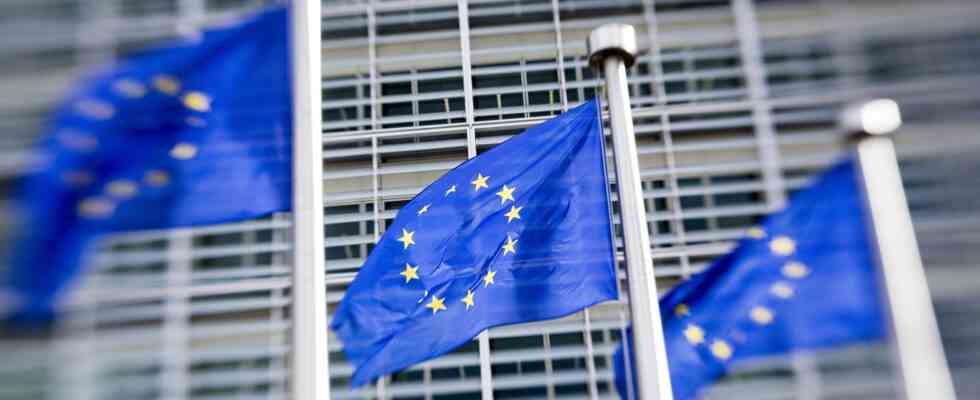Exclusive
Status: 06/20/2022 08:00 a.m
A joint office for various European news agencies reporting on EU issues is currently being set up in Brussels. Yet some partners seem problematic, like that NDR media magazine ZAPP reported.
The EU Commission is setting up a so-called “European Newsroom” in Brussels: starting July 1, journalists from 16 European news agencies are to report from a joint office in the building of the Belgian agency Belga. The German Press Agency (dpa), which is merging with other large agencies such as the French AFP, the Italian ANSA or the Spanish EFE, is in the lead.
Part of the money for this, around 1.76 million euros, comes from the Commission’s budget for public relations, which also provides financial resources for the “Euronews” channel, for example. To this end, the agencies involved and their correspondents are to produce a news overview twice a week, which is intended to offer a “pan-European perspective on EU politics”. According to the responsible EU commissioner, Thierry Breton, this will “enhance citizens’ access to high-quality information”.
News summaries are to be delivered to the Commission and published on a separate website. According to the dpa, the contents are brief excerpts from agency reports on EU topics, which are published with a delay and with reference to the respective agency service.
EU Commission increasingly involved in media policy
The EU has been taking action against disinformation and fake news for a long time. A new law on digital services (Digital Services Act, DSA) regulates stricter supervision of online platforms and more consumer protection. Internet companies should be obliged to act faster and better against hate speech, disinformation and counterfeit products.
At the beginning of the Russian attack on Ukraine, the Russian foreign broadcasters RT and Sputnik were shut down in the EU, and the EU Commission put the media Rossiya RTR/RTR Planeta, Rossiya 24/Russia 24 and TV Center International on the sanctions list at the beginning of June.
The fact that the Commission uses large agencies for an EU news portal is initially not surprising: almost all large media portals use their reports, and those who do not have their own correspondents or reporters in Brussels are often exclusively dependent on them. As a result, agency reports mostly dominate the news situation on EU topics. This dominance is further reinforced by its own EU portal with a Europe-wide participation of relevant agencies.
Doubtful Serbian partner
The problem, however, is that, according to various experts, there are serious doubts about the independence and journalistic quality of some of the agencies involved: This becomes particularly clear with the example of the Serbian agency Tanjug. The former official news agency of Yugoslavia has since been privatised, but the Tačno company that owns it maintains close ties with the government of President Aleksandar Vučić.
His government has been criticized for years for restricting press freedom. In the global press freedom ranking of “Reporters Without Borders” the country had meanwhile slipped down to 93rd place, and is currently 79th out of 180 countries. Serbian journalists repeatedly complain that the state discredits, hinders and threatens them.
On the other hand, pro-government media are given generous subsidies, criticizes “Reporters Without Borders”. Tanjug mainly reports in favor of the ruling party, says Serbian journalist Marija Vučić from the fact-checking portal Raskrikavanje: “There are hardly any critical articles there,” but instead there are “obvious false reports.”
Wrong Klitschko quote spread
For example, Tanjug spread an alleged quote from the mayor of Kyiv, Vitali Klitschko. Tanjug reported at the end of May that he compared the war in Ukraine with that of the Albanian population in Kosovo against the “Serb occupiers”. In Serbia, such comparisons provoke outrage because the independence of the former Serbian Kosovo has still not met with broad acceptance. The quote spread correspondingly rapidly in the Serbian media. Finally, even Serbian Interior Minister Aleksandar Vulin condemned the statement.
But the quote is fictitious: Vitali Klitschko distanced himself in a Facebook post and denied ever having made such a statement. Raskrikavanje’s fact check revealed that the Albanian portal from which Tanjug originally took the report had no imprint and the article had no author. It is completely unclear where the quote should come from.
Because Tanjug is known in Serbia for questionable reports and obvious partisanship in favor of the government, Serbian journalist associations have criticized its inclusion in the European Newsroom and publicly protested against the EU Commission’s allocation of funds. On request from ZAPP and tagesschau.de A spokesman for the Commission simply replied, “Tanjug, like all other agencies involved, will comply with their obligations within the framework of the European Newsroom.”
Journalistic standards guaranteed?
On request, dpa spokesman Jens Petersen refers to the editorial charter of the European Newsroom, which calls for factual and independent reporting. These obligations result from a funding agreement with the EU Commission, in which the NDRmedia magazine ZAPP as part of a research cooperation with netzpolitik.org. The documents come from a freedom of information request to the EU Commission.
The spokesman for the EU Commission emphasized that it was stipulated that the participants could act “independently of any instruction, pressure or mandate from any EU institution or member state”. “The journalists are completely free in their decisions and do not receive any political instructions for their daily work,” said the spokesman. Petersen, sees “no possibility of influencing the reporting of the agencies involved”.
But for experts like the media rights expert Flutura Kusari from the European Center for Press and Media Freedom in Leipzig, that’s not enough: state-affiliated news agencies like Tanjug from Serbia or ATA from Albania are controlled by their governments and are not independent: “PR agencies don’t deserve any support EU funds,” she said.
The EU runs the risk of distributing money to news organizations that are considered “government mouthpieces” in the region. This will “seriously damage the EU’s image in the Balkans and give these agencies a European platform they don’t deserve.”

